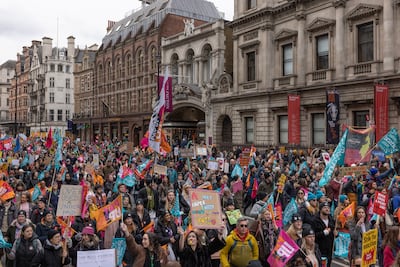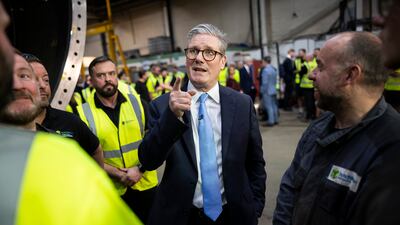In the run-up to July's general election in the UK, Keir Starmer said he wanted the economy to achieve annual growth of 2.5 per cent – a rate the British economy hasn't seen consistently in nearly 10 years.
Having won the election, the Labour government toned down the hyperbole somewhat and Chancellor Rachel Reeves set a more formal target that the UK should achieve the fastest per capita growth in terms of GDP among the G7 for two consecutive years.
On Thursday, the staggering UK economy showed signs of at least stumbling in that direction, as the Office for National Statistics said GDP was estimated to have grown by 0.6 per cent in the second quarter, April to June, following an increase of 0.7 per cent in Q1.
On a monthly basis, the UK economy showed no growth in June, as any boost from the arrival of Taylor Swift was counteracted by wet weather and industrial action.
Thursday's numbers on the economy showed output per capita in the second quarter was 0.1 per cent lower than a year earlier, and 0.8 per cent lower than before the pandemic.
'Distinctly limp'
“Household consumption was up as people have got a few more pennies in their pockets thanks to falling inflation and strong wage growth,” said Danni Hewson, head of financial analysis at AJ Bell.
“That extra cash sloshing around has provided the fuel for the kind of growth that’s been lacking for the past couple of years when the economy seemed to flatline following its post-Covid recovery.
“But it’s not all good news, and June looked distinctly limp as election uncertainty put off some spending decisions by business, whilst the impact of strike action continued to exert pressure on the economy.
“The weather also played a part with retail sales suffering, as summer seemed to go missing for much of the month.
Meanwhile, the Bank of England cut interest rates for the first time in four years earlier this month, bringing relief to many economists who felt the central bank had been leaning on the economy too hard for too long. After 14 consecutive interest rate rises between December 2021 and August last year, rates had been at 5.25 per cent for a year before this month's cut.
On Wednesday, the ONS revealed that inflation, as expected, ticked slightly higher to 2.2 per cent. It had been at the Bank of England's target of 2 per cent for May and June.
Right now, Britain's economy is comfortably growing faster than the rest of Europe, although it lags slightly behind the US.
“There is good reason to expect that the second half of 2024 will be strong, too, given that wages are growing in real terms and the Bank of England has started to loosen monetary policy,” said Jake Finney, economist at PwC.
“However, there is still some way to go if the government is to meet its ambitious target.”
'Fix the foundations'
Britain's new Labour government has wasted no time in clearing the decks of the factors it deems are holding economic growth back.
“We have made economic growth our national mission and we are taking the tough decisions now to fix the foundations, so we can rebuild Britain and make every part of the country better off,” Ms Reeves said on Thursday.
Included in the audit into the nation's finances that Ms Reeves commissioned almost as soon as she took on her new job was a brief to discover just how much the industrial action during the last few years of Conservative rule had battered productivity and severely hamstrung economic growth.
It's thought this found that the economy took a £300 million hit for each day of the teachers’ strikes because of lost working hours, and industrial action in the NHS cost £1.7 billon.
The ONS found that between June 2022 and December 2023, 5.05 million working days were lost, the highest number in a 19-month period for more than 30 years.

As such, the government is anxious to stop the strikes as soon as possible, principally by accepting the recommendations of the pay review bodies. On Wednesday, train drivers were offered a 14 per cent rise over three years.
Junior doctors are in line for a 22 per cent increase, which the Nuffield Trust predicts will cost the NHS in the region of £600 million.
Other public sector workers, like teachers and nurses, are set for a 5.5 per cent wage increase, which the Institute for Fiscal Studies calculates could cost £10 billion.
The logic is that once the reins of industrial action are loosened, the economy can surge ahead. But the flipside of that argument is the risk that pay increases could feed through into inflation and reawaken the beast the Bank of England has spent the last two years taming with interest rate rises.
For former Bank of England economist, Stuart Cole, above-inflation pay deals are “a negative for productivity growth” but they take “a bit of time to work through the system, whereas strikes have an immediate negative impact on output”.
“Starmer's whole economic plan is based on boosting growth, so he is taking the quick-fix solution now of paying up to avoid strike action,” he told The National.
“It is a short-term fix which has heavier costs over the medium term. But politics is all about short-term wins.”
Keeping the pace up
Economists are quick to point out that at 5 per cent, relatively speaking, interest rates are still high and growth, while outstripping much of Europe, remains sluggish.
“This pace of growth is not set to last,” said Anna Leach, chief economist at the Institute of Directors.
“Business surveys point to modest momentum through the summer months, no doubt affected by still-high interest rates.”
Some analysts contend that speed is of the essence and rapid economic growth is needed for Labour pledge to fix Britain's crumbling public services to become reality. It's one reason why the first six weeks of the new administration has been a flurry of activity.
“While short-term growth is reassuring, it is essential to address issues that have hindered long-term economic growth,” said Hailey Low, associate economist at the National Institute of Economic and Social Research think tank.
“Persistent challenges such as low productivity growth, strained public finances, and inadequate infrastructures have acted as barriers to achieving sustained growth.
“Tackling these challenges will remain crucial for policymakers during this parliament and beyond.”


